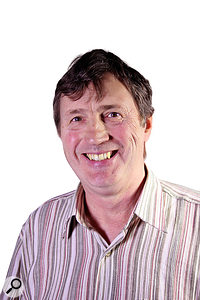The well-known physicist Albert Einstein is credited with saying, "Everything should be made as simple as possible, but not a bit simpler". In this age when almost everything seems to be dumbed down to below the point of usefulness, that seems very useful advice. While undue complexity is unarguably a bad thing, there is a point beyond which things can't be simplified further without throwing away something useful, and that is just as true of digital recording systems as it is of higher physics.
Sound On Sound is fast approaching its 20th birthday, and in some ways, things have changed almost beyond recognition since we set out, but in other ways they haven't changed much at all. Take audio sequencing software for example — pretty much everything that we get bundled with today's software was part of the hardware studio two decades ago. Even MIDI has changed little since 1985, except that now we get it in colour instead of on a 12-inch Atari monochrome monitor! OK, so there are a few welcome new additions, such as Auto-Tune, but by and large, what we have now, we had then. The real difference as I see it is that back in 1985, only professionals working in seriously high-end studios had access to all these things, but today anyone buying even a 'lite' version of a mainstream sequencer gets the whole lot in a box — a multitrack recorder, mixer with full automation, state-of-the-art MIDI sequencing and more effects and processors than you can shake a digitally rendered stick at. Oh yes, and all those synths and samplers that you used to stare at longingly through the shop window.
What clearly isn't obvious to many users is that although a couple of hundred pounds will turn your computer into a very serious recording studio, it's not any easier to use than the multi-million-pound major studios of the '80s. I say this because we still get letters, emails and phone calls from people who say 'why can't they make all this stuff easier to use? It's far too complicated!'. Certainly it is possible to make simpler software, but then you don't have access to all the professional tools and features, so at some point you have to commit yourself to learning about all aspects of all types of studio equipment if you want to make the most of your home studio. After all, the engineers who used the original hardware did it as a career, not as a hobby, and most of them started out when there was a much smaller choice of equipment available, so they assimilated knowledge as they worked, rather than having to learn it all before they started out.
I guess what I'm saying is that learning how to use all of today's recording tools is complicated — not because the manufacturers are trying to make your life difficult, but because that's the nature of the beast. Music recording is a serious academic subject, and if you thought having to learn a sequencer was unreasonably difficult, that's only half the story, as there's mic technique, mixing and the principles of synthesis to learn about too.
If you find that prospect daunting, then perhaps the most sensible way forward is to follow the paths of the original studio engineers by restricting the options you use to handle the basics and only exploring further when you have become completely familiar with what you already use. It's amazing what you learn when you're restricted to eight audio tracks, a couple of compressors and a reverb unit! Learning about recording can be immense fun, but it's probably less so if you make the mistake of trying to use everything at once before you've found out what it's for. The best records of our time were made using far fewer facilities than you have access to, so take your time, explore, and learn as you go. Like most learning experiences, sound recording is a journey and the destination continues to recede as you make progress, because only then do you realise how much more there is to know. Anyone who's embarked on a music technology course because they thought it was an easy option knows exactly what I mean!
Paul White Editor In Chief
